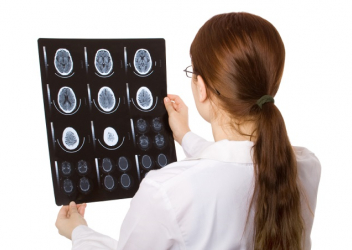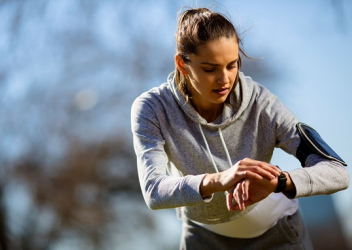Optimizing Concussion Care and Advancing Treatment
The Minds Matter Concussion Program at Children's Hospital of Philadelphia has demonstrated a fundamentally forward-thinking mindset with its comprehensive approach to optimizing concussion care. Researchers have been hard at work phenotyping concussion with clinical and objective measures and the adoption of an active therapeutic approach to treatment. In contrast, international experts and other practitioners in the region still recommend rest with minimal guidance about active therapies.
We reject the notion that all concussions are the same and should be treated with the same, passive approach. Our research continues to use novel methods to quantify recovery and enroll concussed patients in randomized clinical trials to further investigate promising active therapies.
By implementing a personalized approach to concussion care, we can target specific deficits through emerging novel treatments to accelerate recovery and improve quality of life for these children.
Optimizing Concussion Care Research
- Implementing the Minds Matter Model in Other Communities More
In order to address gaps in care and improve health outcomes for all youth with a concussion, the Minds Matter team has been exploring how to best implement its evidenced-based concussion care model in clinical and school settings beyond the CHOP health system and community.
- Visio-Vestibular Rehabilitation
The Effect of a Home Exercise Program on Visio-Vestibular Function in Concussed Pediatric Patients
This prospective study sought to determine the effect of a visio-vestibular home exercise program (VV-HEP) on symptoms and visio-vestibular function in concussed pediatric patients. A sample of 527 adolescents patients reporting to a specialty care concussion center within 28 days of injury were prescribed the VV-HEP at initial visit. At follow-up, patients who had completed the VV-HEP reported lower symptom endorsement and lower symptom severity than patients who had not started the VV-HEP and those in progress. The findings suggest that a VV-HEP can effectively reduce visio-vestibular dysfunction following concussion. Future work should investigate whether inequities of concussion care access may be minized with a VV-HEP.
Vestibular Rehabilitation Is Associated with Visio-Vestibular Improvement in Pediatric Concussion
This study sought to determine whether active vestibular rehabilitation was associated with improvement in visio-vestibular deficits in children with concussion. In a sample of over 100 children with concussion who were referred to vestibular rehabilitation, symptoms decreased and performance on visio-vestibular tasks and the Balance Error Scoring System improved, after the course of therapy. Future work should determine the optimal post-injury timing of this rehabilitation
- Remote Patient Monitoring: ED Concussion Care ContinuityMore
This 5-year research project aims to improve the accuracy of concussion risk using physiologic markers of injury and assess the feasibility of a remote patient monitoring mobile eHealth tool to facilitate specialist access and care continuity. The objective is to match novel therapies to pediatric concussion patients experiencing persistent post-concussion symptoms (PPCS) by incorporating objective visio-vestibular deficits into risk models and utilizing a remote patient monitoring (RPM) tool to improve specialist access and care continuity.
- Remote Patient Monitoring: Use of Ecological Momentary Assessment (EMA) to Track SymptomsMore
As a research strategy, EMA can capture objective measures of physical activity, reports of cognitive activity, and symptomatology in real-time in pediatric patients. With EMA, we can understand the time-varying nature of concussion recovery in youth. As a clinical tool, EMA can help clinicians monitor their patients’ recovery in real-time and adjust care plans accordingly.
- Driving after Concussion: Examination of the Adolescent Brain and Behaviors
This 4-year research project aims to establish the evidence base for return to drive recommendations for adolescents after a concussion. The objective is to examine the neurophysiological functioning of the recovering concussed adolescent brain while managing driving tasks, the association between their neurophysiological functioning and clinical assessments, and the nature of concussed adolescents’ engagement in risky driving behaviors. The project will employ driving simulation, fNIRS, and pupillometry as measures of neurophysiological function; examine the association of these objective measures with clinical assessments; and prospectively quantify driving behaviors of concussed adolescents with objective on-road in-vehicle monitoring and ecological momentary monitoring of concussion symptoms. Research publications include:
Changes in Driving Behaviors After Concussion in Adolescents
In this 2020 study, the Minds Matter Concussion Registry was used to characterize and compare adolescent driving behaviors after concussion. This study found that nearly half of teens who sought specialty care for a concussion had returned to driving before returning to exercise or sports. The findings from this study suggest a need for evidence-based guidance on safely returning to driving for adolescents with concussion.
An Integrative Review of Return to Driving After Concussion in Adolescents
This 2020 review summarizes the current literature on return to driving after concussion in adolescents. Based on articles published between 2016 and 2020, heathcare providers are unclear on how to determine if a patient is fit to drive. This review highlights the need for future studies to examine clinical predictors of return to driving readiness in adolescents.
- AMSSM Exercise Therapy Trial
Select publications include:
Early Targeted Heart Rate Aerobic Exercise Versus Placebo Stretching For Sport-Related Concussion In Adolescents: A Randomised Controlled Trial
Adolescents with Sport-Related Concussion Who Adhere to Aerobic Exercise Prescriptions Recover Faster
Measuring Recovery With Ecological Momentary Assessment in a Randomized Trial of Exercise After Sport-Related Concussion
Adolescents With More Oculomotor and Vestibular Signs of Sport-Related Concussion Benefit from Aerobic Exercise: An Exploratory Analysis
Exercise-Induced Vision Dysfunction Early After Sport-Related Concussion Is Associated With Persistent Postconcussive Symptoms
- Practice Patterns in Pharmacological and Non-Pharmacological TherapiesMore
In a survey of multiple clinical sites in North America, we explored common practice variation in the management of pediatric concussion, with a focus on understanding the frequency at which providers prescribed medications (e.g. non-steroidal anti-inflammatories) and other therapies (e.g. rest or exercise therapy). Journal of Neurotrauma. 2019.
- Branched Chain Amino Acids As a Pharmacological Therapeutic for Concussion More
Research into the use of branched chain amino acid (BCAA) supplementation in concussion recovery for adolescents has shown promise for reducing concussion symptoms and providing a faster return to physical activity. This is the first human study to evaluate the effectiveness of BCAA supplementation in concussion and is a breakthrough step for potential development of a targeted therapeutic for concussion.
- Electronic Clinical Decision SupportMore
This study demonstrated that the provision of clinical decision support tools, coupled with in-person training, led to an 85% increase in clinicians documenting a visio-vestibular exam and a 129% increase in their reporting return-to-learn and return-to-play guidelines discussion with patient families, two recommended concussion management strategies. During the study period, July 1, 2010, to June 30, 2014, researchers identified and followed 14,527 concussion-related primary care office visits for 7,284 unique patients, mostly between the ages of 5 to 19 years old. In the pre-intervention period, performance of the visio-vestibular exam was documented in the EHR for only 1.8 percent of concussion visits.
In contrast, 71% of visits in the post-intervention period included evidence of this exam for an overall 129% increase from July 2012 to June 2014. During the pre-intervention period, 19% of concussion visits included EHR documentation of sharing return-to-learn and return-to-play guidelines. In contrast, in the post-intervention period these phrases were found in 73% of EHRs for a total increase of 85%. The vast majority of exams performed in the post-intervention period (95%) were documented within a “Concussion SmartSet” template in CHOP’s electronic health record system, EpicCare®, showing that the template facilitated performance and systematic documentation of the exam components.
Watch Dr. Christina Master explain the importance of seeking medical attention for children with any type of head injury:











